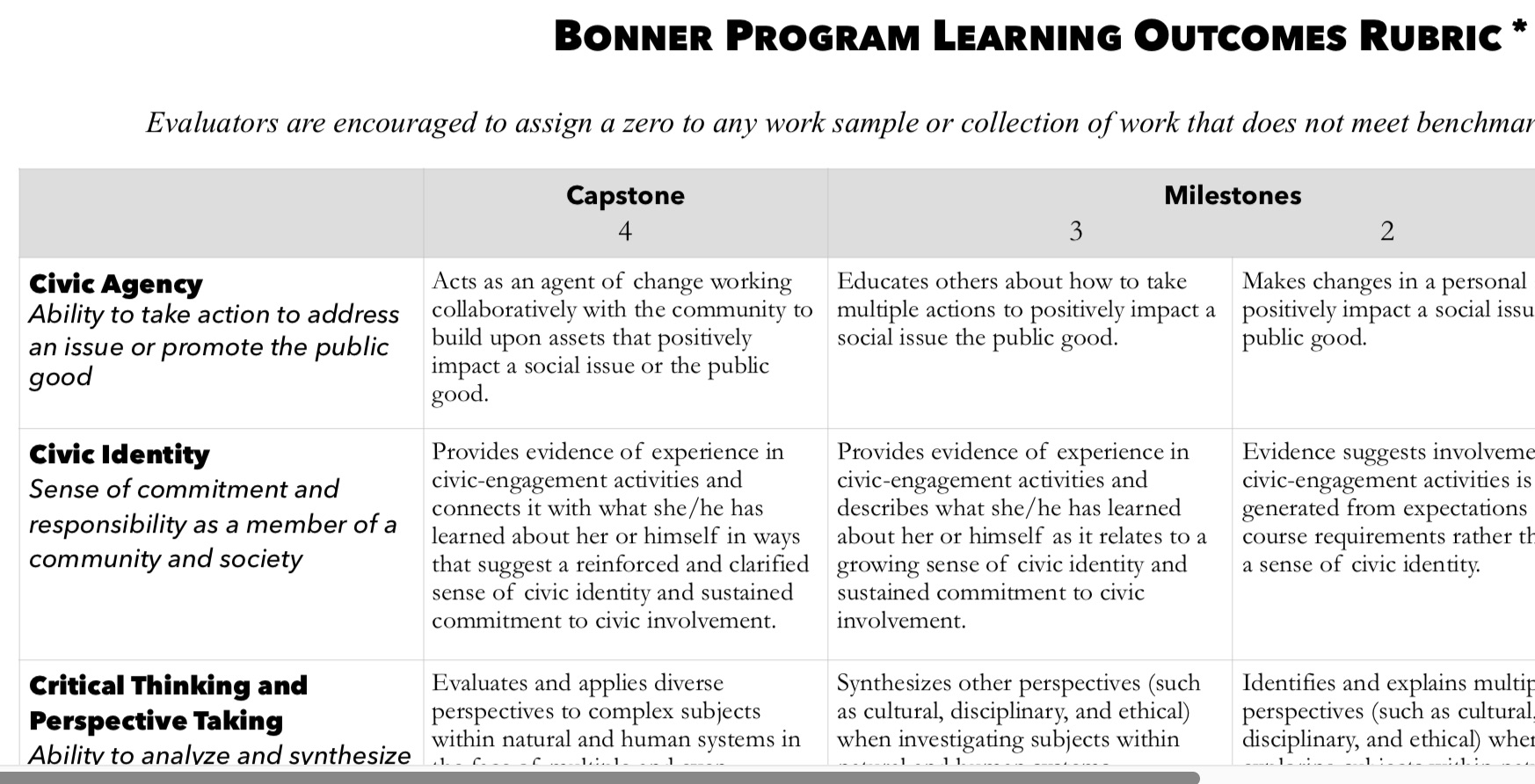Learning Outcomes Rubric
Over the past decade, the Bonner Foundation and colleges and universities in the Bonner network have begun to formalize a set of learning outcomes connected to the co-curricular, curricular, and integrative experiences associated with its four-year civic engagement program.
The draft Bonner student learning outcomes rubric below draws on rubrics developed as part of the VALUE initiative of the Association of American Colleges and Universities and the Massachusetts Department of Higher Education, including the Civic Engagement, Civic Values, Civic Knowledge, and Integrative Learning Rubrics.
Our goal is that when students graduate from the Bonner program, they achieve the following post-graduate learning outcomes:
Civic Agency
Ability to take action to address an issue or promote the public good.
Capstone level — Acts as an agent of change working collaboratively with the community to build upon assets that positively impact a social issue or the public good.
Civic Identity
Sense of commitment and responsibility as a member of a community and society.
Capstone level — Provides evidence of experience in civic-engagement activities and connects it with what she/he has learned about her or himself in ways that suggest a reinforced and clarified sense of civic identity and sustained commitment to civic involvement.
Critical Thinking
Ability to analyze and synthesize diverse perspectives.
Capstone level — Evaluates and applies a wide range of perspectives to complex subjects within natural and human systems in the face of multiple and even conflicting positions (i.e. cultural, disciplinary, and ethical.)
Communication
Ability to effectively communicate in different formats and forums.
Capstone level — Effectively tailors communication strategies to effectively express oneself, listen to, and adapt to others to establish relationships to further constructive action.
Diversity and Intercultural Competence
Understanding and capacity to learn from and with others.
Capstone level — Demonstrates evidence of ability to work with and learn from a wide range of communities and cultures.
Empathy
Ability to relate to and share feelings of others.
Capstone level — Compassionately draws connections between self and the feelings, perspectives, or life experiences of others across multiple dimensions of difference.
Integrative Learning
Click to download copy of draft Bonner Program Learning Outcomes Rubric.
Connects relevant experience and academic knowledge.
Capstone level — Meaningfully synthesizes connections among experiences outside of the formal classroom (including life experiences and academic experiences such as internships and travel abroad) to deepen understanding of fields of study and to broaden own points of view.
Leadership
Capacity to collaborate with and lead others to achieve a goal or common purpose.
Capstone level — Demonstrates independent experience and shows initiative in leadership of complex or multiple civic engagement activities, accompanied by reflective insights or analysis about the purposes and accomplishments of one’s actions.
Place-BASED Knowledge
Understanding of facets of a specific community or issue.
Capstone level — Demonstrates and applies knowledge of a particular community and/or issue as evidenced in a culminating project or role.
Social Justice
Abilities to examine and act to promote fairness and equity.
Capstone level — Collaborates with relevant stakeholders to analyze and take action to effectively address injustices.
TEAMWORK
Ability and willingness to contribute to and foster constructive team climate.
Capstone level — Completes assigned tasks by deadline, maintains positive attitude about the team, the work accomplished is thorough, and helps other team members with their tasks.
WELLNESS
Ability to identify and apply healthy choices and resilient behavior in life.
Capstone level — Advocates for their own and other’s needs and locates resources to meet those needs. Employs positive strategies to manage stress and supports others’ resilience.
Beyond the benefits of co-curricular, curricular, and integrated community service and engagement for student learning shared above, the Bonner model and framework also provides structural supports for students to grow as leaders on campus and in the community, as well as civic minded professionals on and off campus.
These supports include a cohort-based model, where students actively participate in an inclusive, diverse learning community characterized by active training, education and reflection, community building, and dialogue across difference.
The Bonner program is also structured as an intentional, four-year developmental pathway, where students are trained to progress from direct service work to higher level engagement in the community, including capacity building and advocacy initiatives. Within this pathway, they are also supported in strengthening their campus leadership, so that they may serve in instrumental roles on campus that deepen campus-wide engagement and foster a culture of service on campus.
Lastly, through strategic and targeted training throughout all four years, students identify, develop, and integrate service and civic engagement passions, academic studies, and career interests.

